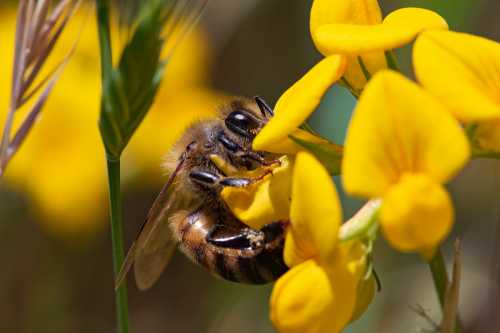What Makes Honey Taste Sweet?
If you have a sweet tooth and you love honey, you may be wondering why honey tastes so good and what makes honey taste sweet?
The short answer is:
The sweet taste of honey comes from the combination of sugars it contains.
The chemicals within the sugars are detected and bind to taste sensors on the tongue, which in turn send a signal of sweetness to the brain.
But there's a more to it than that, and some honeys are sweeter than others - read on for more information!
What Makes Honey Taste Sweet?
Honey is made by bees from the sugary nectar gathered whilst foraging on flowers, which is mixed with the bee's own bee enzyme, and then stored in wax honeycombs.
If we want to know what gives honey the characteristic of sweetness, we need to look deeper at the composition of honey, and also the role of our taste buds in detecting that tantalizing sweetness.
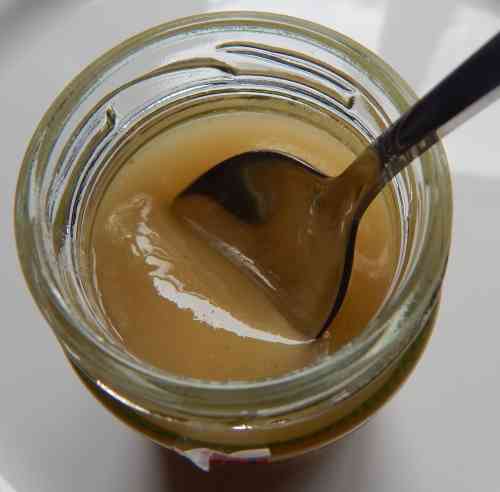 The different varieties of honey available offer their own distinct flavors.
The different varieties of honey available offer their own distinct flavors.The role of sugars
When we think of sugar, the first thing that springs to mind is usually table sugar, or perhaps the lumps of sugar added to coffee or tea.
However there is much more to sugar than that!
The term 'sugars' refers to a whole group of sweet-tasting carbohydrates. Included in this group of carbohydrates are:
- glucose,
- fructose,
- sucrose,
- maltose,
- lactose, and
- galactose.
All sugars are sweet (as are some other organic molecules that are not 'sugars').
Given that honey is mostly made from nectar (which comprises primarily fructose, glucose and sucrose) it is not surprising that honey contains a range of sugars.
| Amount Of Sugars In Honey (Per 100g) | ||
|---|---|---|
| Total Sugars | 82.g | |
| Sugars | ||
| Sucrose | 890mg | |
| Glucose | 35744mg | |
| Fructose | 40934mg | |
| Maltose | 1440mg | |
| Galactose | 3100mg | |
The values above may vary, depending on the variety of honey tested.
Is honey sweeter than table sugar?
Whilst honey consists of a combination of sugars, white table sugar consists of just one of the sugars mentioned above (sucrose).
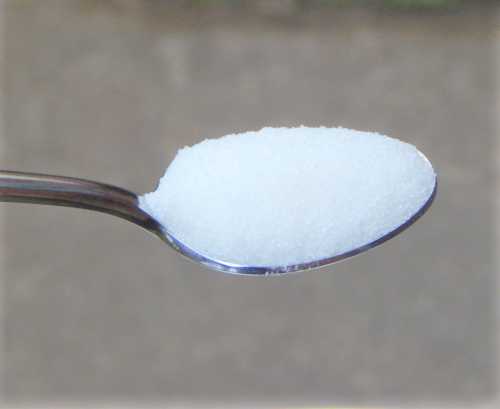 Is a spoonful of sugar sweeter than a spoonful of honey? Which would you prefer?
Is a spoonful of sugar sweeter than a spoonful of honey? Which would you prefer?
According to a comparison table in the book "The World Of chemistry: Essentials", in which a list of sugars are graded in their level of sweetness relative to sucrose, one of the main sugars contained within honey (fructose) is indeed sweeter than sucrose according to the scale.
As you can see from this table, sucrose is given a sweetness level of 1. Any score above 1 indicates a sweetness level higher than sucrose (table sugar).
| Sweetness Of Common Sugars And Artificial Sweeteners Relative To Sucrose | ||
|---|---|---|
| Substance | Sweetness Relative To Sucrose As 1 | |
| Sugars | ||
| Lactose | 0.16 | |
| Galactose | 0.32 | |
| Maltose | 0.33 | |
| Glucose | 0.74 | |
| SUCROSE | 1 | |
| Fructose | 1.17 | |
| Artificial Sweeteners | ||
| Aspartame | 180 | |
| Saccharin | 300 | |
| Splenda | 600 | |
However, the other sugars contained within honey (glucose, maltose and galactose) have a lower sweetness score than sucrose, and it's not clear what effect this may have on the overall sweetness score of honey.
Certainly variations in honey can occur depending on the variety of the honey. In particular, nectar gathered by bees can have varying sugar concentrations.
Indeed, research has found that some honeys are sweeter than others, and score more highly than table sugar on the sweetness scale.
The balance of different sugars is an important point, because there are thresholds for detection of taste by the taste receptors in the mouth.
These thresholds differ among chemicals that taste the same. For example, sucrose, and lactose may taste sweet to humans, but the sweet taste is elicited by these chemicals at concentrations of roughly 10 mmols, and 30 mmols respectively.
This would suggest that it takes a larger quantity of lactose than sucrose to deliver the same level of sweetness.
From the table you can also see that artificial sweeteners have the highest scores, but for me, what really sets honey apart is the flavor.
How we recognize sweetness and why honey tastes so good
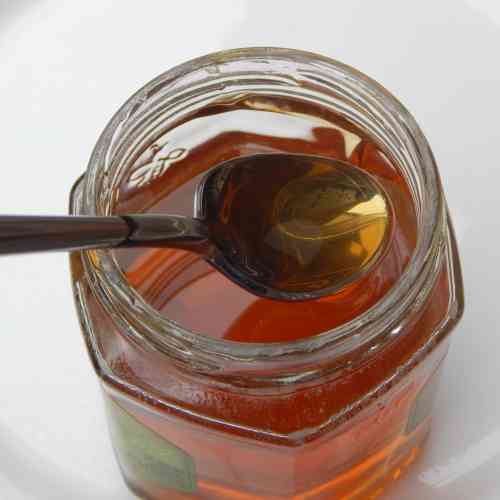
The explanation for this lies in the taste buds - or taste receptors in the mouth (although the sense of smell also plays a role in the experience of taste).
In other words, whilst honey contains a number of sugars which have the potential to taste sweet, experiencing the sweetness of honey relies on the taste buds of the individual to be able to detect that sweetness.
Sweetness is detected by groups of between 50 and 150 protein-based receptor cells in the taste buds. A network of taste nerves is interwoven among the taste cells.
These taste nerves are stimulated by the binding of the chemicals found in sweet foods such as honey, to the taste receptors, resulting in the transmitting of a message we describe as 'sweet tasting' to the brain.
Not all animals can detect sweet tastes - cats for example cannot taste sugars, so they are unlikely to appreciate the sweetness of honey.
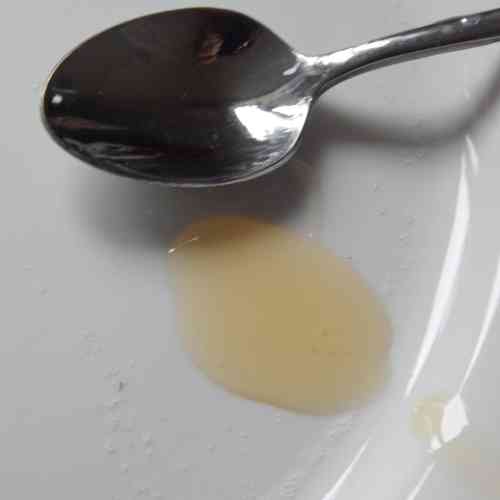 To my taste buds, honey offers a range of deep, aromatic flavors.
To my taste buds, honey offers a range of deep, aromatic flavors.
I still like to use sucrose (table sugar) for the bulk of my baking, but to my taste buds, honey offers a deeper flavor. But given that honey comprises mainly sugars, what is it that makes honey so delightful?
Quite simply, the delicate aromatic properties of honey (thanks to the bees and the individual fragrant nectar offerings of the flowers, such as those found in herbs) are one of the key reasons why honey tastes so good.
Then again, it should also be mentioned that taste is a personal experience for each individual, which brings me to my next point.
Does honey taste the same for everyone?
Five taste types are generally recognized by humans, and these are: sweet, savory, salty, sour and bitter.
In humans, there is tremendous variation in ability to detect the different taste types.
For this reason, people may describe their experiences differently, or have different preferences for each of the flavor types from Tupelo or Locust honey, to honeydew honey.
The differences reflect the number of particular taste buds each person has for each taste type, which in turn affects capacity to detect and experience taste.
For this reason, even if two people describe the taste of the same honey, such as Tupelo honey, as 'sweet', they will nevertheless experience that sweetness differently.
Borage honey is often described as having a delicate flavour, but no doubt each person will have their own perception of its taste.
Add into this the fact that around one in four people is regarded as a "supertaster", with significantly more sensitive taste buds than other people, and it's quite clear that honey, as well as other foods, will taste different for each person.
The role of the sense of smell in taste
Honey offers a range of distinct and delicious aromas depending on the variety selected, but potentially, your ability to detect the subtleties of taste between the different honeys available, may depend partly upon your sense of smell.
Why?
Have you ever noticed how your sense of taste is impaired when you have a cold with a blocked or stuffy nose? This is because the sense of smell also affects the sensation of taste. Thus the overall experience of tasting honey will partly rely on your sense of smell.
Why do we crave sweet tasting foods?
Probably because the taste of foods indicates the presence of some biological benefit to the body.
Sweet foods usually indicate energy-rich nutrients, so once consumed, the body is rewarded with energy.
References
- Chalcoff VR, Aizen MA, Galetto L. Nectar concentration and composition of 26 species from the temperate forest of South America. Ann Bot. 2006;97(3):413–421. doi:10.1093/aob/mcj043
- Joesten, Melvin D; Hogg, John L; Castellion, Mary E (2007). "Sweeteness Relative to Sucrose (table)". The World of Chemistry: Essentials (4th ed.). Belmont, California: Thomson Brooks/Cole. p. 359. ISBN 978-0-495-01213-9. Retrieved 14 September 2010.
- The Physiology Of Taste - Colorado State University
- Nutritiondata.self.com/
- America's Sweetest Honey - American Bee Journal
If you found this page helpful or interesting, I'd really be grateful if you would share it with others - if not this page, perhaps another, such as Gardening For Bees.
Thank you so much :) .
